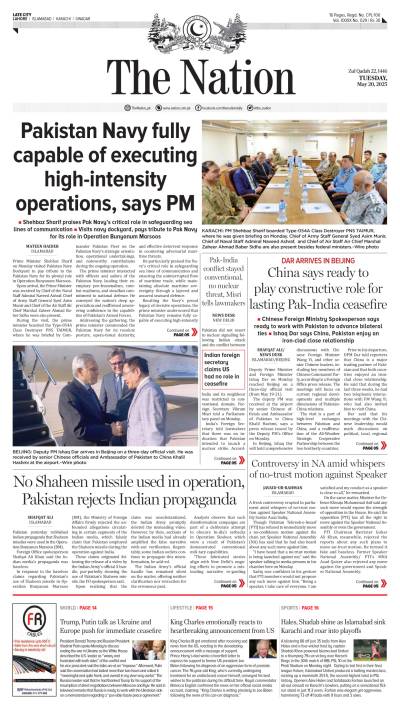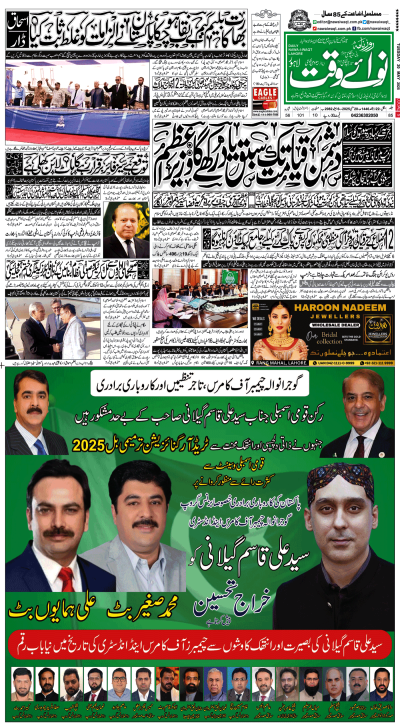Kamil Khan
One of the mistakes multinational companies make is to look at countries as either ‘developed’ or ‘developing’, and then try to shoehorn a product or solution into that country that doesn’t quite fit. These narrow definitions might be appropriate in the boardroom, but they fail to capture the complexities and opportunities that exist. One size doesn’t fit all.
Like many other countries, Pakistan is a hybrid market. It has large populations in urban centers, with high levels of disposable income, a concentration of financial institutions and access to sophisticated technology, such as smart phones and Internet. It also has a huge population – 63 percent – living in rural areas, which is underserved by technology and financial services.
Whether in urban areas or rural settings, Pakistanis have one thing in common – an over-reliance on cash. So much, that the State Bank of Pakistan (SBP) today is rightly exploring possibilities to decrease the dependence on cash and increase the reach and penetration of electronic payments through branchless banking regulations.
The trouble with cash
According to a 2011 World Bank study, roughly 90% of Pakistan’s 177 million people (2011 figures) do not have an account at a formal financial institution. This represented 160 million people, which is larger than the populations of Egypt and Turkey combined.
Without access to formal financial services and the electronic payment products and services – such as credit, debit and prepaid cards – linked to them, consumers and businesses are left to conduct their daily activities in cash.
Cash is costly to protect and risky to carry; if it’s lost or stolen, it can’t be replaced. Cash-based activity also reduces governments’ ability to curb shadow-market activity.
Electronic forms of payment that are linked to bank accounts not only replace cash with alternatives that are more transparent, efficient, secure, reliable and convenient, they also spur economic growth.
According to a 2012 study by Moody’s Analytics, growth in the use of electronic payment products, such as credit and debit cards, added more than $470 billion cumulatively to economies in Asia Pacific between 2008 and 2012 by reducing transaction costs and improving efficiency in the flow of goods and services.
As we survey the landscape in Pakistan and realm of possibilities, we see tremendous potential for electronic payments to transform commerce and daily life. But, doing so will require a multi-faceted approach.
Urban needs
The payments landscape is quickly changing. The widespread adoption of the Internet and mobile technology is extending the benefits of electronic payments to more people in more places.
For consumers, innovation such as NFC payments (contactless) for smart phones will speed up checkout time and reduce the need to pay with cash. As will services like person-to-person money transfer and reoccurring bill pay. We are currently exploring opportunities with industry members to bring such services to more places where conditions allow.
For merchants who want to grow their businesses, having the means to sell products and accept payments online will help them reach a global customer base. Visa acquired one of the world’s largest providers of eCommerce management services in 2010 to do just that.
Meanwhile, the evolving payments ecosystem is reducing costs for merchants and propelling innovation, like the introduction of low cost mobile-point-of-sale (mPOS) “card readers” that plug into smart phones.
Such devises are helping drive the uptake of cashless payments in many markets where traditional acceptance infrastructure simply does not exist, as well as in places such as farmers markets, coffee shops and taxis in developed markets.
To realize the potential of this technology, Visa is partnering with banks across Asia Pacific on various mPOS pilots, including a wet market in Malaysia and fruit seller in Thailand, to help merchants accept card payments that have never previously been able to. In Pakistan, we are working with industry partners to roll out MPOS in 2014.
Rural areas
One of the primary reasons people in Pakistan and around world remain financially underserved is because it is difficult for financial institutions to provide services like bank branches in a business-sustainable way to remote and rural villages and towns.
Statistics from a 2012 State Bank of Pakistan strategy paper on banking sector reforms show that, on average, there were merely 2,500 financial outlets in rural Pakistan that served an astounding 105 million customers, reflecting a sharp contrast in the supply of and demand for affordable financial services. This means that, on average, each bank in rural Pakistan serves 42,000 people.
The advent of mobile technology has enabled new branchless banking solutions that can provide affordable services to the unbanked – known as “financial inclusion” – in areas traditional financial services have yet to penetrate. Instead of receiving cash, “mobile money” is transferred electronically from one mobile account, which is backed by a mobile network operator and a financial institution, to another, and the funds are stored to an account on a password-protected mobile phone.
The funds can be used to buy goods and services at a store, or can be transferred to another person who also has a mobile money account. They can also be withdrawn for cash as needed, a little like visiting an ATM in other parts of the world.
Pakistan is poised to reap the benefits of mobile money solutions. The Pakistan Telecommunication Authority reported that as of 2011, there were more than 131 million mobile users in Pakistan, with a large number in rural areas.
Such conditions establish a favorable environment to reach Pakistan’s under-banked with mobile money solutions. As a part of Visa and backed by VisaNet, which is secure, reliable, scalable and interoperable with disparate networks, the Fundamo platform is helping to bring secure financial services to areas where there is high mobile phone penetration but a large consumer base with little or no access to bank accounts.
For example, bKash Limited launched a new mobile money service in Bangladesh in 2011, powered by Fundamo. Now half of the estimated 150 million people in the nation who have mobile phones also have access to mobile financial services to save and transfer money, and buy goods and services. Today, the bKash service has more than 5 million subscribers and 20,000 agents nationwide.
Ingredients for success
If we get the balance of solutions right, we can build a safe, reliable and inclusive financial infrastructure. This would not only boost consumer confidence, but also Travel and Tourism by making it more convenient for visitors to access and manage their funds while on the go.
We think success in building a fully inclusive financial system in Pakistan rests on three pillars.
Innovation, in some ways, this is easiest. Introducing contactless payments like Visa payWave, mobile money solutions, EMV chip (“smart card”) technology, into a market is not complicated. However, delivering an innovative retail payments network at large scale, is difficult. Making electronic payments accessible, relevant and affordable for everyone takes more than product and business-model innovation – although mobile technology is critical.
Interoperability, or the ability for banks to provide – and consumers to use – products and services to make payments across different channels, such as online, face-to-face, and via mobile phone, is critical. We now have the right technology, and with the right level of cooperation, Visa is strongly positioned to reach Pakistan’s 130+ mobile subscribers with reliable and secure financial services via their mobile phones.
Partnership is perhaps the most important pillar. Banks, MNOs and the payment schemes need to collaborate to promote sustainable payment growth and advance financial inclusion in Pakistan. Through collaboration, we will be able to build a payment ecosystem which is secure and innovative and provides Pakistani consumers access to the world class payment solutions they rightly deserve.
As an example of the three pillars in practice, NADRA, United Bank Limited and Visa collaborated to distribute aid to families that were displaced during the unrest in the Northwest Frontier Province in 2009.
This partnership enabled the distribution of aid on Visa prepaid cards, each loaded with 25,000 rupees. Terminals were also installed at local businesses to accept payment cards, which also connected them to the global payments network.
These terminals helped displaced persons use their prepaid cards to buy much-needed food, medicine and other essential supplies from local merchants. Since the prepaid cards were linked to a bank account at a licensed financial institution,
it provided the first opportunity for many of them to be financially included in the formal financial system. As a result of the program, more than 270,000 new bank accounts were created, offering otherwise financially excluded citizens access to secure and reliable financial services.
Visa believes that everyone should have access to efficient and secure financial services to be able to lead dignified lives. As we survey the changing payments ecosystem and resultant new possibilities, we believe there’s an opportunity to deliver financial services to everyone in Pakistan. Visa, for one, is looking forward to working closely with all stakeholders to make that happen.
(The writer is the Country Manager, Visa Pakistan and Afghanistan)
Tuesday, May 20, 2025
Building a fully inclusive financial system in Pakistan

-
Lahore emerges among safest global cities in Numbeo 2025 index
-
Lahore emerges among safest global cities in Numbeo 2025 index
-
India’s suspension of Indus Water Treaty legally baseless
-
Seventh polio case reported in Pakistan amid nationwide vaccination drive
-
Pakistan reports sixth polio case of 2025
-
PTA begins issuing VPN licences to regulate usage
The Wider War
May 20, 2025
Margalla on Fire
May 20, 2025
Defeated and Depressed
May 20, 2025
Regional Reset
May 19, 2025
Peak Potential
May 19, 2025
Worse than Anarchy
May 20, 2025
Salute to our Air Force
May 20, 2025
An Unbreakable Wall
May 20, 2025
Profiteering Milk
May 20, 2025
Rewriting the Rules
May 20, 2025
ePaper - Nawaiwaqt
Nawaiwaqt Group | Copyright © 2025





